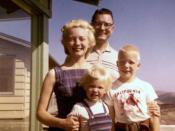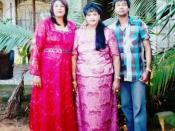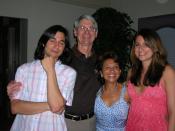"Not of course that families are helpless, but their role is different than in the past. Observers once spoke of the dissolution of the family. We recognize now that the family does not disappear, rather it changes, and adapts and develops new patterns; but always, it maintains the crucial functions of giving the family members a place in society; socializing the children and stabilizing the relationship between a man and a woman."
The authors of Families in Canada define the nuclear family as a family unit composed of both a mother and a father who have one or more children. Simply put, Canada's nuclear family is generally a family that is not united with the kinship support network of an extended family. More complexly stated, The Harper Dictionary of Modern Thought defines the nuclear family as:
..the characteristic family unit of developed industrial societies which consists solely of husband, wife, and children, and spans only two generations.
The nuclear family is more mobile socially and geographically, and allows more autonomy and relative freedom. On the other hand, it produces an observed increase in tension and stress; and rising divorce rates, increases in delinquency, and weakening of cultural transmissions have all been blamed, with some justification, on the nuclear family.
This definition includes a few positive and negative factors that the nuclear family sustains. Today's modern nuclear family is definitely more mobile socially and geographically and allows for the autonomous freedom of its members. In addition, according to the authors, the negative factors have been identified as a result of the nuclear family. The discussion following is an attempt to identify the societal influences that have possibly manipulated the nuclear family in to producing these positive and negative results. Being such a primary social unit, as in the first definition, the...


